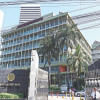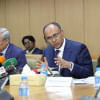Policy rate hike looms again as previous attempts yield little success

Taming inflation is the priority of the new government, so the central bank is likely to increase the policy rate further to beef up its fight against the stubbornly high consumer prices.
The Bangladesh Bank is set to unveil its Monetary Policy Statement (MPS) for the second half of the current financial year today.
It comes at a time when the economy faces growing pressure owing to escalated inflation and persisting foreign exchange crisis, with the Red Sea crisis adding fresh headache.
A number of central bankers who are involved with the formulation of the MPS told The Daily Star that the BB has framed the policy for the January to June period in a cautious manner because the economy has been witnessing severe pressure and the low-income groups have been bearing the brunt of higher inflation for nearly two years.
"The central bank will raise the policy rate slightly because it has already been set at the highest level," said one central banker.
The policy rate, also known as the repo rate, is a powerful tool of monetary policy and central banks all over the world regulate the money supply, inflation levels and liquidity using it.
Commercial banks borrow money from the BB at the repo rate, which stands at 7.75 percent currently. India's policy rate is 6.50 percent.
Central banks prepare monetary policies to keep prices at a tolerable level, maintain a low unemployment rate, protect the currency, and maintain a healthy economic growth.
By regulating interest rates or reserve requirements or through open market operations, a central bank affects borrowing, spending, and savings rates.
Amid the economic uncertainty, the central bank of Bangladesh had designed its MPS for the first half of 2023-24 as per the prescription of the International Monetary Fund (IMF) as the lender approved a $4.7 billion loan for the country in January last year.
Since then, the banking regulator has hiked the policy rate three times from 6 percent to 7.75 percent to cool price increases. Overall, the rate has been revised upwards by eight times since the beginning of the Russia-Ukraine war in February 2022.
The lingering fallout of the coronavirus pandemic and the devastating war were initially responsible for the country's current economic woes. But the crisis has lingered and also deepened owing to inadequate policy responses on the part of the government and the central bank.
In recent months, the BB got rid of the 9 percent lending rate and introduced a new interest rate regime, known as the Six-months Moving Average Rate of Treasury bill (SMART).
Still, inflation rose 9.5 percent in December, way above the government target of 6 percent for 2023-24, which ends in June. It has been running well above 9 percent since March this year.
Recently, Fahmida Khatun, executive director at the Centre for Policy Dialogue, said higher inflation, the exchange rate volatility and lack of governance in the banking sector would have to be addressed in the monetary policy.
The forex reserves stood at $20.18 billion on January 10, down from $40.7 billion in August 2021. Amid the drying up of reserves, the local currency has weakened by more than 27 percent in the past two years, making imports costlier.
"If needed the banking regulator will have to hike the policy rate further. The fiscal policy and the market management will also have to be corrective," Fahmida said.
A senior central banker who previously worked at the BB's monetary policy department said inflation is still high despite hiking the policy rate several times.
"The US dollar supply should increase to control higher consumer prices. The production of essential goods should also go up. Otherwise, the policy rate will not be able to arrest inflation."
The central banker says the allocation of credit for essential commodities like potatoes and onions will have to increase to boost production.
"At the same time, the government should take initiatives to break syndicate in the market."
The central bank had promised to introduce a market-based exchange rate by September last year. It, however, has backtracked and now plans to adopt a new exchange rate regime termed the crawling peg.
The crawling peg is a system of exchange rate adjustments in which a currency with a fixed exchange rate is allowed to fluctuate within a band of rates. It fully uses the key attributes of the fixed exchange regime and the flexibility of the floating exchange rate system.

 For all latest news, follow The Daily Star's Google News channel.
For all latest news, follow The Daily Star's Google News channel. 







Comments